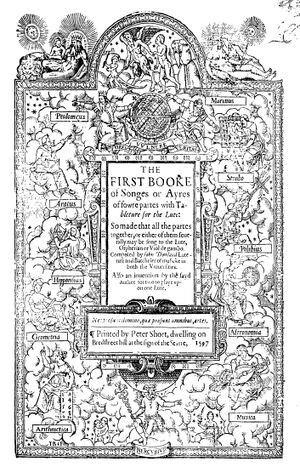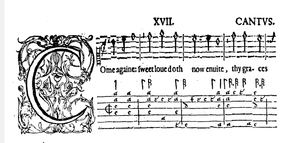Difference between revisions of "Come again! Sweet love doth now invite"
| (6 intermediate revisions by the same user not shown) | |||
| Line 58: | Line 58: | ||
}} | }} | ||
'''"Come again! Sweet love doth now invite"''' (Original: "Come againe: sweet loue doth now enuite") is a song by [[John Dowland]] and appears in his [[First Booke of Ayres]], first published in 1597.<ref name="Wiki"/> | '''"Come again! Sweet love doth now invite"''' (Original: "Come againe: sweet loue doth now enuite") is a song by [[John Dowland]] and appears in his [[First Booke of Songes or Ayres]], first published in 1597.<ref name="Wiki"/> | ||
It appears on the following album: | It appears on the following album: | ||
| Line 68: | Line 68: | ||
|- | |- | ||
| 2021 | | [[2021]] | ||
| [[À sa guitare (Album)]] | | [[À sa guitare (Album)]] | ||
| [[Thibaut Garcia]] | |||
|} | |||
"Come again! Sweet love doth now invite" is part of the following concert program: | |||
{| class="wikitable" | |||
! width="80px"|Year | |||
! Album | |||
! With | |||
|- | |||
| [[2021]] ‐ [[2022]] | |||
| [[À sa guitare (Concert program)]] | |||
| [[Thibaut Garcia]] | | [[Thibaut Garcia]] | ||
|} | |} | ||
| Line 83: | Line 95: | ||
| english-title = | | english-title = | ||
| composer = [[John Dowland]] | | composer = [[John Dowland]] | ||
| lyricist = | | lyricist = Anonymous | ||
| work = [[First Booke of Songes or Ayres]] | | work = [[First Booke of Songes or Ayres]] | ||
| catalogue = | | catalogue = | ||
| Line 94: | Line 106: | ||
{{Libretti | {{Libretti | ||
| country = UK | | country = UK | ||
| language-note = | | language-note = | ||
| libretto-text =<poem>''1'' | | libretto-text =<poem>''1'' | ||
Come again! sweet love doth now invite, | Come again! sweet love doth now invite, | ||
thy graces that refrain, | thy graces that refrain, | ||
to do me due delight, | to do me due delight, | ||
to see, to hear, to touch, to kiss, to die | to see, to hear, to touch, to kiss, to die | ||
With thee again in sweetest sympathy. | With thee again in sweetest sympathy. | ||
| Line 106: | Line 118: | ||
Through thy unkind disdain, | Through thy unkind disdain, | ||
For now left and forlorn: | For now left and forlorn: | ||
I sit, I sigh, I weep, I faint, I die | I sit, I sigh, I weep, I faint, I die | ||
In deadly pain, and endless misery. | In deadly pain, and endless misery. | ||
| Line 113: | Line 125: | ||
By frowns do cause me pine, | By frowns do cause me pine, | ||
And feeds me with delay: | And feeds me with delay: | ||
Her smiles, my springs, that makes my joys to grow | Her smiles, my springs, that makes my joys to grow | ||
Her frowns the winters of my woe. | Her frowns the winters of my woe. | ||
| Line 120: | Line 132: | ||
My eyes are full of streames, | My eyes are full of streames, | ||
My heart takes no delight: | My heart takes no delight: | ||
To see the fruits and joys that some do find | To see the fruits and joys that some do find | ||
And make the storms are me assign’d, | And make the storms are me assign’d, | ||
| Line 127: | Line 139: | ||
Yet will she neuer rue, | Yet will she neuer rue, | ||
Nor yield me any grace: | Nor yield me any grace: | ||
Her eyes of fire, her heart of flint is made | Her eyes of fire, her heart of flint is made | ||
Whom tears nor truth may once invade. | Whom tears nor truth may once invade. | ||
| Line 134: | Line 146: | ||
Though canst not pierce her heart, | Though canst not pierce her heart, | ||
For I that do approve: | For I that do approve: | ||
By sighs and tears more hot than are thy shafts | By sighs and tears more hot than are thy shafts | ||
Did tempt while she for triumphs laughs.</poem> | Did tempt while she for triumphs laughs.</poem> | ||
}}{{Libretti | }}{{Libretti | ||
| Line 181: | Line 193: | ||
Did tempt while she for triumps laughs, | Did tempt while she for triumps laughs, | ||
</poem> | </poem> | ||
<div class="footnotes"> | |||
<poem> | <poem> | ||
<nowiki>*</nowiki>) "loue" → "love"; "enuite" → "invite. Often, "v" and "u" are used interchangeably. | <nowiki>*</nowiki>) "loue" → "love"; "enuite" → "invite. Often, "v" and "u" are used interchangeably. | ||
</poem> | </poem></div> | ||
}} | }} | ||
{{Clear|left}} | {{Clear|left}} | ||
Latest revision as of 21:57, 13 October 2021
| The First Booke of Songes or Ayres | |
|---|---|
| by John Dowland | |
 Cover of "The First Booke of Songes or Ayres"[1] | |
| Published | 1597 |
| Publisher | Peter Short, London |
"Come again! Sweet love doth now invite" (Original: "Come againe: sweet loue doth now enuite") is a song by John Dowland and appears in his First Booke of Songes or Ayres, first published in 1597.[2]
It appears on the following album:
| Year | Album | With |
|---|---|---|
| 2021 | À sa guitare (Album) | Thibaut Garcia |
"Come again! Sweet love doth now invite" is part of the following concert program:
| Year | Album | With |
|---|---|---|
| 2021 ‐ 2022 | À sa guitare (Concert program) | Thibaut Garcia |
Libretto
from First Booke of Songes or Ayres
John Dowland (music), Anonymous (words)
1 | |
Original | |
1 *) "loue" → "love"; "enuite" → "invite. Often, "v" and "u" are used interchangeably. | |
Manuscripts and sheet music

Dowland, John (1597). "The Firste Booke of Songes". IMSLP. Peter Short, London. Retrieved October 1, 2021.
References
- ↑ 1.0 1.1 Dowland, John (1597). "The Firste Booke of Songes". IMSLP. Peter Short, London. Retrieved October 1, 2021.
- ↑ "First Booke of Ayres". Wikipedia. Archived from the original on October 2, 2021. Retrieved October 2, 2021.